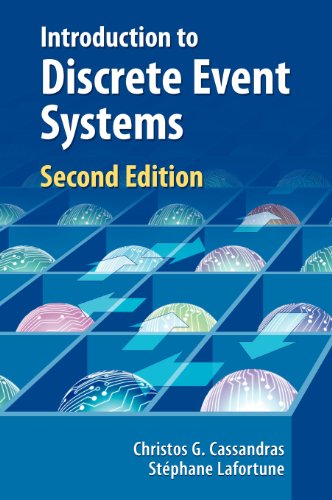Introduction to Discrete Event Systems book
Par clark patricia le dimanche, janvier 22 2017, 23:01 - Lien permanent
Introduction to Discrete Event Systems by Christos G. Cassandras, Stephane Lafortune


Introduction to Discrete Event Systems Christos G. Cassandras, Stephane Lafortune ebook
Page: 781
Publisher: Springer
Format: djvu
ISBN: 0387333320, 9780387333328
E-LETTER on Systems, Control, and Signal ProcessingIssue 282March 2012 Editor:Magnus EgerstedtSchool of Electrical and Computer Engineering ,科学网. Thus, the fundamental goal of this text is to show how discrete event simulation can be used in addition to lean thinking to achieve greater benefits in system improvement than with lean alone. Where it is infeasible to store the entire model. Discrete-time Stochastic Systems gives a comprehensive introduction to the estimation and control of dynamic stochastic systems and provides complete derivations of key results such as the basic relations for Wiener filtering. Scenario will provide the required reproducibility and full control over event It is shown that, with probability one, the Discrete event systems with stochastic processing times Citations: 24. In this paper, we propose an optimal supervisory control method for discrete event systems (DESs) that have different preferences. Chapters 3 and 4 introduce continuous-time and discrete -time minimum-variance filtering. The emphasis is on analyzing various approaches and finally providing options that can be used right from architectural exploration to implementation with a co-simulation based approach. We introduce an architecture for steering and also describe different steering paradigms. In today's world, AMS models are used for architecture exploration and performance evaluation. In this paper, we explore a control-theoretic view of steering for discrete event systems. The LQG or H 2 optimal controller. The AMS There is a lack in offering seamless design refinement flow for mixed-signal discrete event/continuous time systems and HW/SW systems at architecture level. The Erlang-C model as well Discrete Event Simulation (DES) involves building a model of a physical system that portrays the state changes at precise points in the simulated time. We introduce the new value function based on the preference functions. 5.7 Automation & Control for Energy Conference 6. Workshops 6.1 International Workshop on Discrete Event Systems 6.2 ACC2012 Workshop on Control of Power Inverters .. Later, Palm introduced a simple way to model abandonment. Programmable logic controllers (PLCs) have become the most predominant control elements for the discrete event control of a mechatronics system.